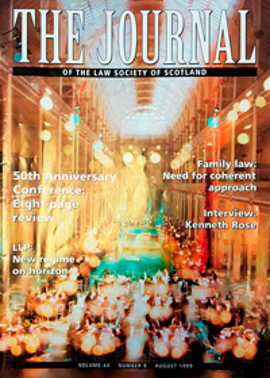Bound by statute
In a keynote address to the 50th Anniversary Conference, Lord Hope of Craighead outlined the circumstances under which legislation passed by the Scottish Parliament might be struck down in the courts.
He highlighted legislation falling foul of the European Convention on Human Rights and that which deviates into the schedule of powers reserved to Westminster as being likely areas where the limits of the Parliament’s legislative competence will be tested.
Lord Hope told delegates: “The function of the courts is to interpret the laws which it (the Parliament) makes, and having done so, to apply those laws to the facts. The system leaves no room for doubt as to what the law is – subject only to the problems of understanding what the law means, which everyone agrees must be left to the judges to decide where there is uncertainty. This is not so where the legislature is itself the creature of statute – such a legislature is not supreme. It is bound by the statute which has created it.
“The people who believe that the Scottish Parliament is their Parliament may well ask what business it is of the judges to tell their Parliament what it can and cannot do.”
He said judges had been given powers of judicial review by the Acts of the Scottish Parliament and that this was a well-established norm throughout Europe and the Commonwealth. Judges would create their own jurisprudence as to the criteria to be applied in defining the boundaries of Parliament’s authority to legislate.
Lord Hope said the need for domestic statutes to be compatible with community law is now reasonably well understood, but that a different approach must be taken to the interpretation of the provisions of the Convention from that which is taken to legislation by Parliament.
He told the conference that the most sensitive situation in which judges will have to decide issues about incompatibility of Convention rights is “where the provision cannot be saved by reading it as narrowly as possible and they are driven to setting the provision aside as incompatible.
“If this were to happen within a short time of its enactment, the process of judicial review could quite easily be presented as an unwarrantable entrenchment upon the wishes of the democratically elected legislature.
“Legislation passed as an immediate response to a sudden rise in criminal activity or to some outrage such as Dunblane would be particularly vulnerable. Strong feelings may have been aroused and a conscious decision taken to ignore warnings about a possible incompatibility. The judges would not welcome the task of having to force the Parliament to think again in such circumstances.”
He added that as no time limit is set by the Scotland Act for an opportunity to challenge an Act “it is quite likely that, as circumstances change and human rights law develops, provisions passed by the Parliament will be found to have become outdated.”
Reserved matters
At the heart of the devolution settlement, the list of reserved matters represents a division of legislative power between the two Parliaments, Lord Hope told the conference.
He said: “Nothing except the political process can prevent the Parliament at Westminster from exercising its sovereign power to make laws for the whole of the United Kingdom.
“But the Scottish Parliament has to respect the limits of its legislative competence, and the Act provides that a provision will be outside its legislative competence in so far as it relates to reserved matters. Much will depend on the way in which that restriction is interpreted by the judges when matters are passed to test its limits as the Scottish Parliament seeks to establish its authority.”
Lord Hope suggested the examples of Canada and Australia could prove instructive as having had to divide legislative power within one jurisdiction between two or more legislatures. Lessons could be learned from Canada’s interpretive approach to the list of reserved matters, an approach which recognised that the list of reserved powers is an essential part of what is in reality a constitutional settlement.
He concluded by saying: “It is an unavoidable consequence of the scheme for devolution which is enshrined in the Scotland Act that it will be for judges to breathe life into the bare bones of the statute.
“Judicial review of Acts of the Scottish Parliament need not be seen as inimical to the interests and wishes of the Scottish people. On the contrary it should, if properly handled, be a creative process which will promote the interests of their democracy.”






